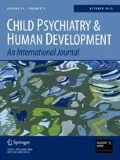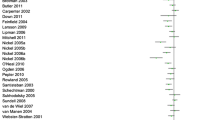Abstract
This study found that length of treatment had a significant effect on the outcome of cognitive behavioral treatment of aggressive boys. Using a quasi-experimental design, a longer eighteen session intervention produced more significant changes in classroom behavior than did a twelve session intervention.
Similar content being viewed by others
References
Roff JD and Wirt RD: Childhood aggression and social adjustment as antecedents to delinquency.Journal of Abnormal Child Psychology 12:111–126, 1984.
Ledingham JE and Schwartzman AE: A 3-year follow-up of aggressive and with-drawn behavior in childhood: Preliminary findings.Journal of Abnormal Child Psychology 12:157–168, 1984.
Robins LN: Sturdy childhood predictors of adult antisocial behavior: Replications from longitudinal studies.Psychological Medicine 8:611–622, 1978.
Allen GJ, Chinsky JM, Larcen SW, Lochman JE and Selinger HV: Behavior modification and community psychology: Effective partners in the schools, inPerspectives in behavior therapy, Upper D (Ed). Champaign, Illinois: Research Press, 1977.
Durlak JA: Providing mental health services to elementary school children, inHandbook of clinical child psychology, Walker CE, Roberts MC (Eds). New York: Wiley, 1983.
Birschenbaum DS: Toward more behavioral early intervention programs: A rationale.Professional Psychology: Research and Practive 14:159–169, 1983.
Camp B, Blom G, Herbert F and Van Doornick W: “Think Aloud”: A program for developing self-control in young aggressive boys.Journal of Abnormal Child Psychology 5:157–169, 1977.
Coats KI: Cognitive self-instructional training approach for reducing disruptive behavior of young children.Psychological Reports 44:127–134, 1979.
Forman SG: A comparison of cognitive training and response cost procedures in modifying aggressive behavior of elementary school children.Behavior Therapy 11:594–600, 1980.
Goodwin SF and Mahoney JJ: Modification of aggression through modeling: An experimental probe.Journal of Behavior Therapy and Experimental Psychiatry 6:200–202, 1975.
Hobbs, SA, Moguin LE, Tyroler M and Lahey BB: Cognitive behavior therapy with children: Has clinical utility been demonstrated?Psychological Bulletin 87:147–165, 1980.
Kettlewell PW and Kausch DF: The generalization of the effects of a cognitive-behavioral treatment program for aggressive children.Journal of Abnormal Child Psychology 11:101–114, 1983.
Lochman JE, Burch PR, Curry JF and Lampron LB: Treatment and generalization effects of cognitive behavioral and goal setting interventions with aggressive boys.Journal of Consulting and Clinical Psychology 52:915–916, 1984.
Lochman JE, Nelson WM III and Sims JP: A cognitive behavioral program for use with aggressive children.Journal of Clinical Child Psychology 10:146–148, 1981.
Robin AL, Schneider M and Dolnick M: The turtle technique: An extended case study of self-control in the classroom.Psychology in the Schools 73:449–453, 1976.
Urbain ES and Kendall PC: Review of social-cognitive problem-solving intervention with children.Psychological Bulletin 88:109–143, 1980.
Copeland AP: The relevance of subject variables in cognitive self-instructional programs for impulsive children.Behavior Therapy, 12:520–529, 1981.
Copeland AP, Hammel R: Subject variables in cognitive self-instructional training.Cognitive Therapy and Research 5:405–420, 1981.
Lochman JE, Lampron LB, Burch PR and Curry JF: Client characteristics associated with treatment outcome for aggressive boys.Journal of Abnormal Child Psychology, in press.
Kendall PC: Cognitive-behavioral self-control therapy for children.Journal of Child Psychology and Psychiatry 24:173–179, 1984.
Kendall PC and Wilcox LE: Cognitive-behavioral treatment for impulsivity: Concrete versus conceptual training in non-self-controlled problem children.Journal of Consulting and Clinical Psychology 48:80–91, 1980.
Schleser R, Meyers AW, Cohen R and Thackwray D: Self-instruction interventions with non-self-controlled children: Effects of discovery versus faded rehearsal.Journal of Consulting and Clinical Psychology 51:954–955, 1983.
Parrish JM and Erickson MT: A comparison of cognitive strategies in modifying the cognitive style of impulsive third-trade children.Cognitive Therapy and Research 5:71–84, 1981.
Kendall PC and Zupan BA: Individual versus group application of cognitive-behavioral self-control procedures with children.Behavior Therapy 12:344–359, 1981.
Campbell DT and Stanley JC:Experimental and quasi-experimental designs for research. Chicago: Rand-McNally, 1973.
Meichenbaum DH and Goodman J: Training impulsive children to talk to themselves: A means of developing self control.Journal of Abnormal Psychology 77:115–126, 1971.
Spivack G, Platt J and Shurt M:The problem-solving approach to adjustment. San Francisco: Jossey-Bass, 1976.
Breyer NL and Calchera DJ: A behavioral observation schedule for pupils and teachers.Psychology in the Schools 8:330–337, 1971.
Gresham FM and Lemanek KL: Social skills: A review of cognitive behavioral training procedures with children.Journal of Applied Developmental Psychology 4:239–261, 1983.
Dodge KA, Coie JD and Brakke NP: Behavior patterns of socially rejected and neglected preadolescents: The roles of social approach and aggression.Journal of Abnormal Child Psychology 10:389–410, 1982.
Lochman JE and Lampron LB: Cognitive behavioral intervention for aggressive boys: Seven month followup effects. Unpublished manuscript, Duke University Medical Center, 1984.
Campbell DT: Reforms as experiments, inHandbook of evaluation research, Vol 1, Struening EL, Guttentag M (Eds). Beverly Hills, California. Sage, 1975.
Braswell L, Kendall PC and Urbain ES: A multistudy analysis of socioeconomic status (SES) and the measures and outcomes of cognitive-behavioral treatment with children.Journal of Abnormal Child Psychology 10:443–450, 1982.
Author information
Authors and Affiliations
Rights and permissions
About this article
Cite this article
Lochman, J.E. Effects of different treatment lengths in cognitive behavioral interventions with aggressive boys. Child Psych Hum Dev 16, 45–56 (1985). https://doi.org/10.1007/BF00707769
Issue Date:
DOI: https://doi.org/10.1007/BF00707769




